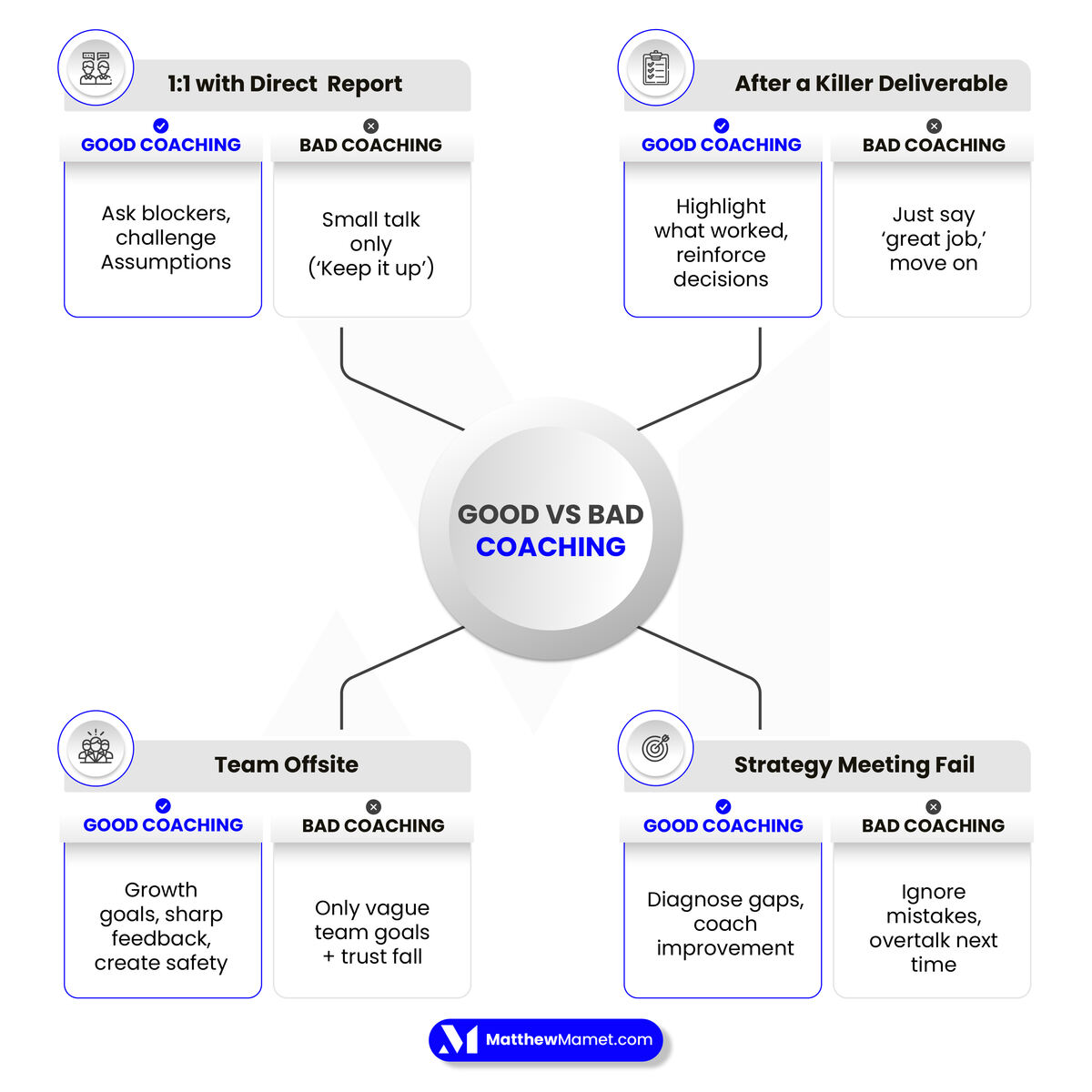Summary:
Effective coaching is not about providing comfort or occasional check-ins but is a powerful tool for accelerating performance and fostering growth. It involves challenging conversations, actionable feedback, and a tight feedback loop to ensure immediate application and improvement. Leaders should integrate coaching into daily interactions, focusing on specific skills and behaviors to enhance team output. This approach is crucial for both team members and executives, as it drives continuous development and prevents stagnation. By embedding coaching into regular activities, leaders can significantly elevate organizational performance.
Table of Contents
Most Coaching Is Too Soft to Matter
Coaching Is a Performance Tool, Not a “Check-In”
The Feedback Loop Is the Secret Weapon
“I Don’t Have Time to Coach” = You’re Not Delegating Enough
What Coaching Looks Like When It’s Done Right
Coaching Is Also for Execs - Especially the High-Performing Ones
If you're treating coaching like it's just warm fuzzies or once-a-quarter check-ins, you're doing it wrong. Real coaching is high-impact, fast-feedback, and built to move the needle - not your feelings. Here’s how to get it right whether you lead a team or are growing as an exec yourself.
Most Coaching Is Too Soft to Matter
I once sat in on a 1:1 where the exec thought they were “coaching” their head of marketing. They spent 40 minutes talking about work-life balance, complimented their work ethic, and wrapped by asking how they could be “more supportive.” Zero challenge, no tracking, nothing actionable. Looked more like a therapy session with snacks.
Here’s the blunt truth: coaching isn’t a warm bath. It’s a catalytic tool. When done right, it unlocks performance, growth, speed, and sharper decision-making. It’s not about being nice - it’s about being real, tough when needed, and dead practical.
Too many managers hide behind soft coaching because they don’t want the discomfort of hard conversations. But the point isn’t to be comfortable. The point is to help your team actually level up. Coaching is productivity fuel, not managerial virtue signaling.
Coaching Is a Performance Tool, Not a “Check-In”
Coaching should do one thing well: accelerate performance.
This means you’re not asking “How are you feeling about that project?” You’re asking:
- What’s getting in the way of better output?
- Where are you spending cycles that aren’t delivering results?
- What skill shift or behavior change would unlock your next level?
The best execs I coach don’t coddle people. They stretch them. They’re clear that coaching is tied to improved decision-making, better prioritization, stronger influencing skills. These are the lever points that change outcomes.
You walk out of every effective coaching conversation with insight + tactics to deploy right now. Not next quarter. Not after that LinkedIn learning module. Now.
The Feedback Loop Is the Secret Weapon
Coaching only works if there's a tight feedback loop. If someone gets coaching on Monday but it doesn’t shift their actions by Thursday, you’ve failed.
What works better:
- Set a specific behavior or deliverable to improve (e.g. “clarify key metric tradeoffs in your roadmap review”)
- Observe performance in a real-life situation (meeting, deck, 1-pager)
- Debrief quickly, give direct feedback, adjust, repeat. That week.
Real growth happens in weeks, not quarters. It lives in the space between reps - how fast people can process feedback and apply it. Coaching without short loops turns into chat therapy.
Look at what HubSpot did on their path to lean. They didn’t just roll out frameworks - they coached specific squads hard, got signal fast, measured outcomes fast, and looped in learnings. Execution demand + coaching tightens signal like a bowstring.
“I Don’t Have Time to Coach” = You’re Not Delegating Enough
The #1 excuse I hear: “I don’t have time to coach, I’ve got to run the business.” Nonsense. That’s like a football coach saying “I’m too busy calling plays to run drills.”
If you’re not coaching, you’re holding the team’s performance ceiling down. Full stop.
The trick is you don’t block off hours. You embed coaching in everything already happening:
- Turn 1:1s into weekly rep reviews on critical work
- Coach in the moment during exec meetings (interrupt when someone misses the mark)
- Text feedback after you see a deck or email: quick, tight, real-time
Executives who coach in motion scale better. I saw this done at TripAdvisor, where one VP turned design reviews into powerhouse coaching loops. The team leveled up output in 6 weeks - not from courses, from tight, embedded moments of stretch.
What Coaching Looks Like When It’s Done Right

Want more structure? I built out more on coaching during uncertainty in this piece. Hint: the best leaders teach people how to lead through change, not avoid or freeze under it.
Coaching Is Also for Execs - Especially the High-Performing Ones
Here’s something we don’t talk about enough: the higher up you are, the more you need coaching.
Why? Because the feedback evaporates. No one tells you the truth. You stop growing. You stagnate.
But coaching for execs isn’t soft mentoring - it’s sharp reflection, honest feedback, and unearthing blind spots that slow you down. The execs I work with know when it’s time to:
- Rethink prioritization frameworks
- Change how they influence other execs
- Delegate better without losing control
- Shift their leadership style as org stage evolves
You can’t brute-force your way through that growth. You need external perspective. And you need someone who isn’t afraid to say: “That decision? That’s ego, not strategy.”
Read more about how coaching high-level talent works here - especially the counterintuitive part about coaching your high-performers even more, not less.
How to Start If You’ve Never Really Coached Before
If you’ve never coached much and it feels awkward, good. That means you’re not falling into the “pretend mentor” trap. Start with this:
- Pick 1 skill or deliverable you want someone to level up
- Ask them to rate themselves 1 - 10 on it
- Share your 1 - 10 score back to them (gutsy move, builds clarity)
- Ask: What would make that a 9 in your book? And what do you think I’d need to see to call it a 9?
- Work backwards to actions. That’s coaching.
Then? Watch them do it. Give real-time feedback. Reset. Loop.
Want more on building these habits across a team? I break it down in this post about team building, especially how coaching folds into performance management and career ladders.
The best part: coaching scales. When your leaders get good at it, your whole org runs sharper.
Want Better Results? Coach for Them.
Here’s the thing: coaching is not an optional perk. It’s a leadership core skill. It’s the difference between running in place and driving compounding growth. It’s what makes your team better - every week, not just on a poster.
A final thought: you probably remember your worst manager. But you definitely remember the one who coached you. Because they changed your trajectory. Be that for someone else. Start today.
Ready to drive more growth & achieve bigger impact?
Leverage my 25+ years of successes and failures to unlock your growth and achieve results you never thought possible.
Get Started




